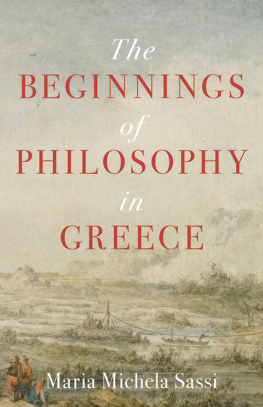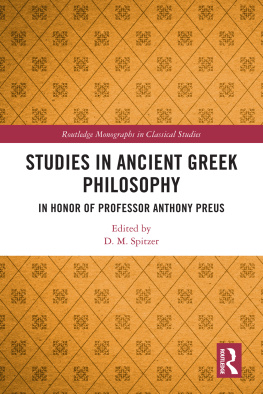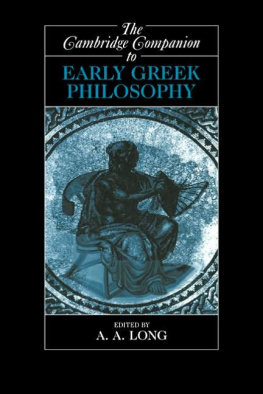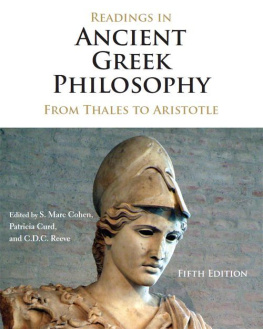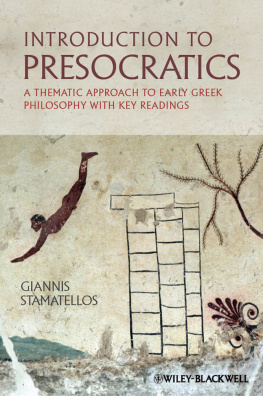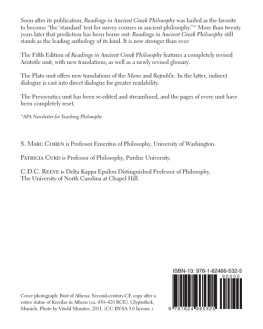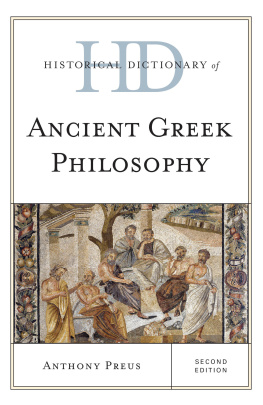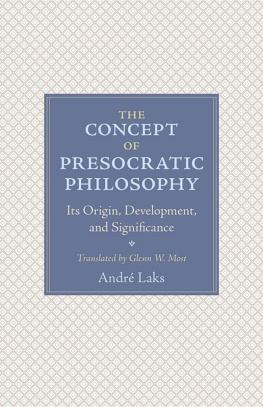
THE BEGINNINGS OF PHILOSOPHY IN GREECE
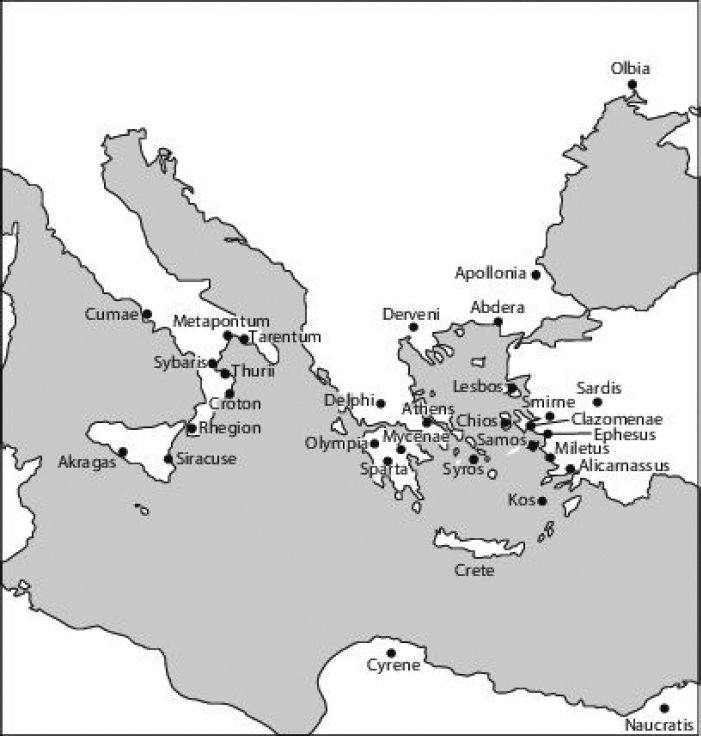
The Beginnings of Philosophy in Greece

Maria Michela Sassi
Translated by Michele Asuni
PRINCETON UNIVERSITY PRESS
PRINCETON & OXFORD
Originally published as Gli inizi della filosofia in Grecia, copyright 2009 by Bollati Boringhieri; this English translation is published by arrangement with the publisher and is copyright 2018 by Princeton University Press.
Published by Princeton University Press,
41 William Street, Princeton, New Jersey 08540
In the United Kingdom: Princeton University Press,
6 Oxford Street, Woodstock, Oxfordshire OX20 1TR
press.princeton.edu
All Rights Reserved
Library of Congress Cataloging-in-Publication Data
Names: Sassi, Maria Michela, 1955 author.
Title: The beginnings of philosophy in Greece / Maria Michela Sassi ; translated by Michele Asuni.
Other titles: Inizi della filosofia in Grecia. English
Description: hardcover [edition]. | Princeton, NJ : Princeton University Press, 2018. | Includes bibliographical references and index.
Identifiers: LCCN 2017031659 | ISBN 9780691180502 (hardcover : alk. paper)
Subjects: LCSH: Pre-Socratic philosophers.
Classification: LCC B187.5 .S2713 2018 | DDC 180dc23
LC record available at https://lccn.loc.gov/2017031659
Editorial: Ben Tate and Hannah Paul
Production Editorial: Debbie Tegarden
Jacket Design: Pamela Schnitter
Jacket Credit: Jean-Baptiste Hilaire (17531822), The Ruins of Miletus and the Maeander Valley. Courtesy of Sothebys Picture Library
Production: Jacquie Poirier
Publicity: Amy Stewart
Copyeditor: Anne Cherry
British Library Cataloging-in-Publication Data is available
This book has been composed in Miller
Printed on acid-free paper.
Printed in the United States of America
10 9 8 7 6 5 4 3 2 1
To Bruno and Nicola
lovers of knowledge in different ways
CONTENTS
A NOTE ON THIS EDITION
THIS EDITION PRESENTS a few changes compared to the Italian one. Besides the necessary corrections to oversights found during translation, it contains a revised introduction and several updates to the footnotes. Since neither the essential lines of my argument nor any specific parts of it have changed, I simply added references for works published after 2009 that are particularly relevant to the topics covered in the book, and for a few essays in which I myself have expanded on some points.
This book is also meant for readers who do not know Greek. All of the texts quoted have been translated into English (by Michele Asuni, from my Italian translations unless otherwise noted), but for important terms and passages I have also given the Greek in transliterated form (always in parentheses for direct quotations). Accents are not marked, except for one rare instance of two homographs (Heraclituss bos and bis); the macron sign has been used to indicate long o and e vowels.
The fragments of the Presocratics are cited from Diels and Kranzs edition (where A indicates a testimony, B a fragment). Quotations from Plato and Aristotle use the Stephanus and Bekker pagination, respectively.
For works of secondary literature that have been translated into English, the page numbers indicated in the footnotes refer to the English translation. The date of the original publication is given in brackets.
INTRODUCTION
I BEGAN TO THINK about The Beginnings of Philosophy in Greece during a conference organized in Lille by Andr Laks ten years before the books publication in Italian in 2009. The conference dealt with a fundamental question: What is Presocratic philosophy? (Laks-Louguet 2002). That question expressed the difficulty of giving a unitary definition of so-called Presocratic thought, but more important was that it brought to the fore an intriguing basic issue: is it appropriate to call this thought philosophy, and even to say that it is precisely with that thought that Philosophy with a capital P is born?
Looking in hindsight twenty years later, that conference seems to have marked the rebirth of an already noble research trend on the Presocratics. In fact, there has been an extraordinary increase in publications on early Greek philosophy, whose authors are often, not by chance, scholars who participated in the Lille conference. As just a few examples, limited to the English-speaking world, we must mention at least the Oxford Handbook of Presocratic Philosophy, edited by Patricia Curd and Daniel Graham (2008); Daniel Grahams two-volume edition and translation, The Texts of Early Greek Philosophy: The Complete Fragments and Selected Testimonies of the Major Presocratics (2010); and the completely revised edition, in 2011, of Richard McKirahans Philosophy Before Socrates. An Introduction with Texts and Commentary, first published twenty years before. The last, most important result of this rich season of scholarship has been the publication of the fragments and testimonia of Early Greek Philosophy by Andr Laks and Glenn W. Most in nine volumes of the Loeb Classical Library (2016; a French version of the same work was published simultaneously by Fayard). This edition is destined to change our perception of early Greek philosophy in a significant way, thanks to a series of choices that represent a firm break away from (though not a complete unhinging of) the patterns of reception consolidated during the course of the last century in the framework set up by Herman Dielss Vorsokratiker; the most remarkable indication of this is the inclusion of Socrates (in the section devoted to the Sophists), but there is also, for instance, an extensive section devoted to philosophies and philosophers in comedy and tragedy.
Moreover, this relocation of texts and doctrines (and the addition of a good number of new monographs on single Presocratic authors) has gone hand in hand with a more properly historiographic reflection on the validity and limits of the definition of Presocratic thought, together with a consideration of the vastness and variety of the intellectual endeavor that took place in the period before Socrates. Laks himself undertook the latter path with a series of studies that eventually fed into a book with an eloquent title, whose English translation has been published by Princeton University Press: The Concept of Presocratic Philosophy: Its Origin, Development, and Significance (2018). I have moved in the same direction with the present book. Here I have not tried to delineate a history of the doctrines of single Presocratic authors, nor did I aim to illustrate cameos of strong intellectual personalities such as Anaximander, Heraclitus, Xenophanes, Parmenides, or Empedocleseven though in certain sections of the book I ended up tracing an overview of these thinkers. Rather, I have tried to answer a fundamental question: To what extent are we able to trace the birth of the particular form of knowledge, which today we call philosophy, back to these thinkers, as well as to other more- and less-well-known ones, and also to poets such as Hesiod, or to personalities that are traditionally classified as sages, such as Pherecydes?
It is no longer possible today to accept more or less passively the image of Thales as the first philosopher that the ancient sources (starting with Plato and Aristotle) have handed down to us. We have known for a long time that this is not a historical fact but rather, the fruit of a representation stemming from a retrospective projection of a philosophical ideal of life that is a product of a time much later than that of Thales. As Werner Jaeger demonstrated in a memorable study (Jaeger 1928), the ideal of the superiority of contemplative life originated and developed in the Academy and the Lyceum in the wake of inquiries started by their respective founders, and it immediately accompanied (for promotional purposes, we might say) an elaboration of exemplary images and stories of prior sages that was as rich as the available documentation was lacking (especially in the case of Thales).
Next page
